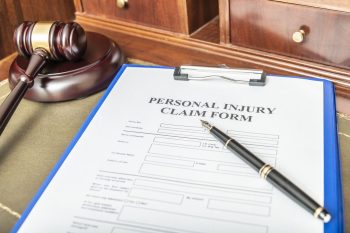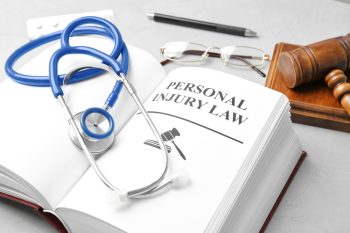Preparing for a Personal Injury Case in New Jersey
Anyone who has ever been injured knows just how confusing and difficult it is to navigate treatment and recovery. From the moment you are first injured, you feel pain, shock, and disbelief. Next, you may worry about where to go for medical help, how much it costs, and whether you really need assistance. As a result, some people are concerned about the cost of an emergency room and choose to do nothing, while others rush off to the nearest hospital without giving it any thought at all.
The fact is that what you do after suffering an injury in an accident can make a substantial difference in any personal injury award you may be entitled to. In addition to hiring an experienced personal injury lawyer, there are many steps that a person can take to help themselves after being injured.
Our attorneys at Chamlin, Uliano & Walsh have extensive experience, skill, knowledge about personal injury cases and can help you fight for the best possible result when seeking compensation for damages from an accident that impacted you emotionally and financially. We have decades of combined experience handling personal injury claims in Monmouth County, Ocean County, and Southern New Jersey in towns like Freehold, Middletown, Holmdel, Asbury Park, Toms River, Belmar, and Brick. We will be here for you every step of the way, guiding you through the process, assisting in your recovery, and fighting for the financial compensation you deserve. For a free consultation about a personal injury case, contact us online or call (732) 440-3950 today to discuss your options.
Consult a Doctor Regarding Your Injury
The causes of injuries and types of injuries sustained vary greatly from case to case. For example, injuries can be caused by a motor vehicle accident, construction accident, bicycle accident, fight, drunk driving, slip, and fall, or general negligence and breach in a duty of care. The injuries can be as simple as a broken arm, or as alarming as a severed limb, loss of eyesight, or even paralysis. But no matter what the basis of the injury is or the types of injuries caused by those accidents, the fact is that the injured person should seek medical treatment.
Not seeking treatment can prove to have a disastrous effect on your health and your potential recovery. Often, people are reluctant to seek medical treatment because they may feel that they are not truly injured. This reason for this may be because the injured person does not have any visible physical injuries, i.e., no bleeding, broken bones, bumps, or bruises. However, simply because there are no physical signs of injury does not mean that you are not, in fact, injured.
Do Not Assume You Haven’t been Injured

Similarly, a lack of physical pain after an accident should not deter you from seeking treatment. In fact, the shock of the situation causes the injured person to not feel any pain at all until hours, days, or weeks later. Seeking appropriate medical care at the outset is a great way to have an independent medical professional assess the situation and potential injuries and subsequent treatment.
Follow all of Your Doctor’s Instructions
After your first encounter with a doctor, he or she will likely give you instructions on what to look out for and follow up treatment. You should always follow the advice of your doctor or seek another opinion if you feel like something is not right. Following through with medical and psychological care is important in any personal injury case because it helps you physically, but it also substantiates the nature of your injuries. Simply saying to an attorney or expert, “I have pain,” without proof of the injuries or follow-up care and documentation may not be enough.
Collect all Evidence to Support Your Claim
Equally as important as seeking medical assistance is making and maintaining records. Such record-keeping will help establish that someone else is at fault, prove the injuries incurred, and shed light on the financial losses you may have suffered as a result.
For instance, after a car accident, you should call the police, obtain insurance information, and eventually collect the police report, statements, and medical records associated with the accident. These items can show precisely who was at fault and why and help prove that you were, in fact, hurt at the hands of another. Additionally, the police report will be a legally acceptable business record of the event that bolsters any claim that you may have. The police officer responding to the scene, his observations, any notes taken about the incident, and tickets given are equally important.
Likewise, there are other people that can become key players in the financial recovery of your injuries. In a slip and fall, you should collect the names of any witnesses, store clerks, managers on duty, as well as their statements. They can attest to the fact that you fell, your injuries, and how you appeared after the fall. More importantly, they may have information about the condition of the store and perhaps the negligence of the store and their role in leading to your injuries. In other cases, any person who was present before, during, or after the accident may have useful information concerning your case.
No matter who is involved in your case, you should always keep records. As noted, the records can include names, addresses, statements, and reports. But the records needed also include medical bills, payments, doctor’s reports, medical records, and lost wages. Never overlook the importance of saving and keeping all of your records, as your attorney will want to review everything.
Get Legal Guidance from a Personal Injury Lawyer
An attorney who has experience in personal injury matters will ask pertinent questions. They will want to know how the injury occurred and where, i.e., at work, home, friend’s house, public building, store, restaurant, or outside. Additionally, they will ask you about your injuries, your employment, missed work, medical care, and follow-up treatment.

Prepare and Initiate a Personal Injury Claim with Help from our Freehold NJ Personal Injury Attorneys
Do not judge yourself about whether you think you took the appropriate steps in your personal injury case. Let our diligent personal injury attorneys at Chamlin, Uliano & Walsh help you and tell you where to go from here to protect your claim. Do not wait before it is too late to file a claim or find out if you have legal justification for pursuing financial compensation from another party.
If you have been injured in any type of accident in Bay Head, Manasquan, Lavallette, Little Silver, Point Pleasant, or another one of the communities throughout Ocean and Monmouth County, help us protect you. Free consultations are available by reaching out to us online or calling (732) 440-3950 to discuss your questions and concerns and begin the process of preparing your personal injury claim as soon as possible.
